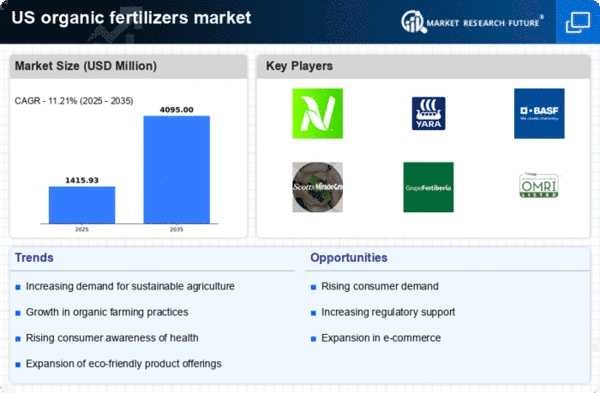Sustainability Initiatives
Sustainability initiatives are playing a pivotal role in shaping the organic fertilizers market. With increasing concerns about climate change and environmental degradation, both consumers and producers are prioritizing sustainable practices. The organic fertilizers market is benefiting from this trend, as many farmers are transitioning to organic methods to reduce their carbon footprint. According to recent data, the organic fertilizers market is expected to reach a valuation of $5 billion by 2027, indicating a robust growth trajectory. This shift towards sustainability is not only driven by consumer demand but also by regulatory frameworks encouraging eco-friendly farming practices. As a result, the organic fertilizers market is likely to see a continuous influx of investments aimed at enhancing production and distribution capabilities.
Increasing Consumer Awareness
The organic fertilizers market is experiencing a notable surge in demand, driven by increasing consumer awareness regarding the benefits of organic farming. As consumers become more informed about the adverse effects of synthetic fertilizers on health and the environment, they are gravitating towards organic alternatives. This shift is reflected in the market, where organic fertilizers are projected to grow at a CAGR of approximately 10% over the next five years. The growing preference for organic produce is compelling farmers to adopt organic fertilizers, thereby enhancing the overall market dynamics. Furthermore, educational campaigns and initiatives by various organizations are fostering a deeper understanding of sustainable agricultural practices, which is likely to further bolster the organic fertilizers market.
Rising Organic Farming Practices
The organic fertilizers market is significantly influenced by the rising adoption of organic farming practices across the United States. As more farmers recognize the long-term benefits of organic agriculture, including improved soil health and reduced chemical dependency, the demand for organic fertilizers is expected to rise correspondingly. Recent statistics indicate that organic farmland in the U.S. has increased by over 15% in the past three years, further propelling the organic fertilizers market. This trend is likely to continue as agricultural policies increasingly favor organic methods, providing farmers with incentives to switch from conventional to organic fertilizers. Consequently, the organic fertilizers market is poised for substantial growth as the agricultural landscape evolves.
Support from Agricultural Policies
Support from agricultural policies is a crucial factor influencing the organic fertilizers market. Various federal and state initiatives are being implemented to promote organic farming, which includes financial assistance and subsidies for farmers transitioning to organic practices. These policies are designed to encourage sustainable agriculture and reduce reliance on synthetic fertilizers. Recent reports suggest that government funding for organic farming initiatives has increased by approximately 20% in the last year, which is likely to stimulate growth in the organic fertilizers market. As these policies continue to evolve, they are expected to create a more favorable environment for organic fertilizers, ultimately enhancing market penetration and adoption among farmers.
Technological Innovations in Organic Fertilizers
Technological innovations are emerging as a key driver in the organic fertilizers market, enhancing product efficacy and application methods. Advances in biotechnology and materials science are leading to the development of new organic fertilizers that offer improved nutrient release profiles and better soil compatibility. For instance, the introduction of bio-based fertilizers is gaining traction, as they are derived from natural sources and are more sustainable. The organic fertilizers market is projected to benefit from these innovations, with an expected growth rate of around 8% annually. As farmers seek more efficient and effective solutions to meet crop demands, the integration of technology into organic fertilizers is likely to reshape the market landscape.

















